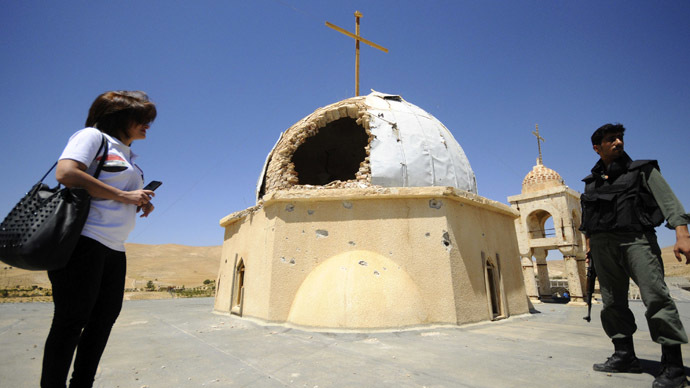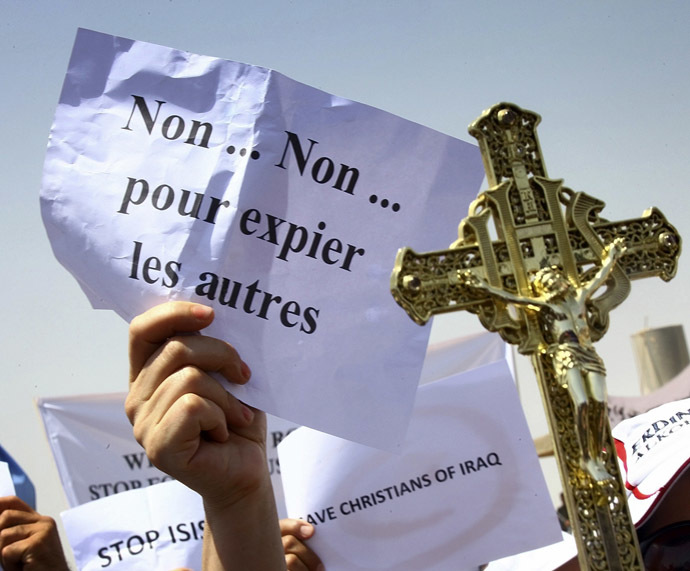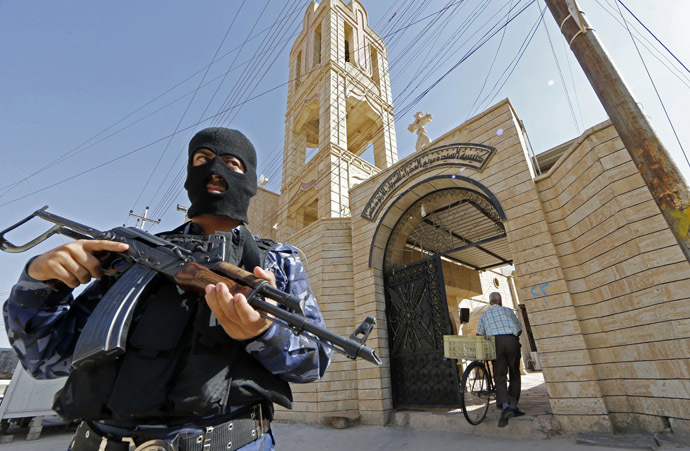Save Christians in the Middle East!

Russia is currently considering the possibility of initiating a draft decision of the UN Human Rights Council on the protection of Christians in the Middle East and North Africa. Russian experts are now working on this document.
In addition, at the OSCE Ministerial Council in Basel on December 4-5, the Russian side will be calling for a thorough analysis of the processes leading to “Christianophobia” in the Middle East and the broader region. The scale of the problems demands the coordination of international efforts to protect Christians in the Middle East. Further initiatives, new measures and relevant discussions aimed at finding durable solutions in this regard are strongly needed. Of course, we believe that Europe, including the UK, should make its contribution to these efforts, taking into account the Christian roots of the European civilization, which are now often forgotten for the sake of political correctness.
Today the Middle East is at the very top of the international agenda. The wave of conflicts in the Arab world affects the interests not only of the region but also of the world's leading players and can have far-reaching consequences, including in the context of intercultural and inter-religious relations. The fate of the region’s religious minorities is of the greatest concern. The mass exodus of Christians, who have been an integral part of the Middle Eastern mosaic for centuries, is particularly troubling.
The war in Syria between government forces and numerous extremist and terrorist groups is continuing. In fact, this country has been turned into a hotbed of international terrorism. Extremists, gathered from around the world, are causing chaos, destroying the cultural and demographic lifestyle that has been formed for centuries, creating an atmosphere of intolerance. The extremists in Syria aim at a genocide of ethno-religious minorities – Christians, Alawites, Kurds.
You may know that ISIL (the Islamic State) has levied head tax on all Christians staying in the respective territories. Moreover, Christians are prohibited from building new and repairing old churches and monasteries. They cannot place crosses on their temples, organize services outside their cult buildings, ring bells or organize sacred processions, or distribute religious attributes or literature. Women are obliged to wear traditional Muslim clothes and cover their heads.

This is only the official policy. In reality, Christians have suffered torture, the shelling of residential areas, schools and other civilian targets, and hostage-taking. Such a situation brings the modern Syrian society, which has always been characterized by the peaceful and respectful co-existence of different ethnic and confessional groups, back to medieval times. All that is absolutely contrary to the true values of Islam as one of the major world religions.
And as the Syrian conflict continues, more reasons appear to seriously fear for the fate of the 2000-year presence of Christianity in this land. At best, we can expect a repeat of the 2003 scenario in Iraq, where the Christian presence has decreased dramatically – from 1.5 million to 150 thousand people.
Regarding Syria, we have always been stressing the need for the Syrian authorities and the opposition to reach a common ground in the fight against extremism. Unfortunately, some of our Western and regional partners adhere to a different point of view and bet on overthrowing Bashar Assad and supporting the armed opposition. As a result, such groups as the Islamic State, Jabhat al-Nusra, and others have emerged and gained ground.
Moscow is also deeply concerned over the persecution of religious minorities living in northwestern Iraq by ISIL militants, forcing thousands of Christians and representatives of other faiths to leave their homes. Moreover, extremists openly declare their intention to throw the whole region of the Middle East and North Africa into the abyss of religious wars. They try to impose on Muslims an unacceptable attitude towards other confessions. Such aggressive and systematic actions of Islamic radicals against particular groups of Iraqi society motivated by religious hatred are completely unacceptable and criminal. We are convinced that jihadists’ attempts to bet on inter-religious conflict and undermine the historical tradition of peaceful co-existence of different faiths on Iraqi soil should be countered in the most decisive and robust way. We favor the achievement of consensus between the political and national forces in Iraq, which subsequently would become the basis for the stabilization of the Iraqi society.
In order to effectively address the terrorist challenge, it is imperative to understand its roots and real scale and to develop a comprehensive strategy. The resolve to fight all forms and manifestations of terrorism without distinguishing between “bad” and “good” terrorists has always been at the center of international anti-terrorist efforts. Regrettably, in the Middle East and North Africa this cornerstone principle has begun to fail and was repeatedly sacrificed for the desire to change a regime in this or that country.
Preventing the persecution of Christians in this part of the world is one of Russia’s foreign policy priorities. We are pursuing a consistent policy in favor of the implementation of reforms in an evolutionary way, taking into account the historical and cultural features of the peoples living in this region. The most important element of our position is to promote a political settlement of the various crises on the basis of international law, without outside interference, by ensuring the recognition and respect for the rights of all ethnic and religious groups.

The statement “On the brutal and mass violations of the rights of ethnic and religious minorities in connection with the worsening situation in Syria and Iraq” adopted by the State Duma of the Russian Federation on November 14 is the most recent manifestation of Russia's strong position on the protection of Christians in the Middle East. The document notes the deep concern over the rapidly deteriorating situation in Syria and Iraq-related terrorist activity that lead to mass violence against religious and ethnic minorities. The statement calls on the international community to take action against terrorism in the region, including by cutting off all sources of assistance and funding. The State Duma urges for developing common approaches to counter terrorism in the Middle East and insists that these should be coordinated by the UN.
In addition to the efforts of the Foreign Affairs Ministry, other Russian ministries and agencies are involved in the protection of the Middle East Christians. Among those – the Ministry of Emergencies and the Ministry of Health, which on a regular basis deliver humanitarian aid to Iraq and Syria. Some regions of the Russian Federation also participate in support for Middle East Christians. In June, the second forum of Christian Youth of Russia, featuring a conference titled “Christianity in the Middle East,” took place in the Republic of North Ossetia – Alania. It brought together young people from Arab countries, as well.
As for Russian NGOs, the most active role is played by the Imperial Orthodox Palestine Society. Within the last three years, its humanitarian missions repeatedly visited Latakia, Damascus, Baghdad, and Erbil, bringing assistance not only to the Christian communities, but also the Kurds, who suffered hugely in northern Syria and Iraqi Kurdistan. Among other major activities of this organization is support for educational programs in the Middle East and participation in the negotiation process aimed at rescuing the suffering people of Syria, Iraq, and Lebanon.
The statements, views and opinions expressed in this column are solely those of the author and do not necessarily represent those of RT.
The statements, views and opinions expressed in this column are solely those of the author and do not necessarily represent those of RT.













